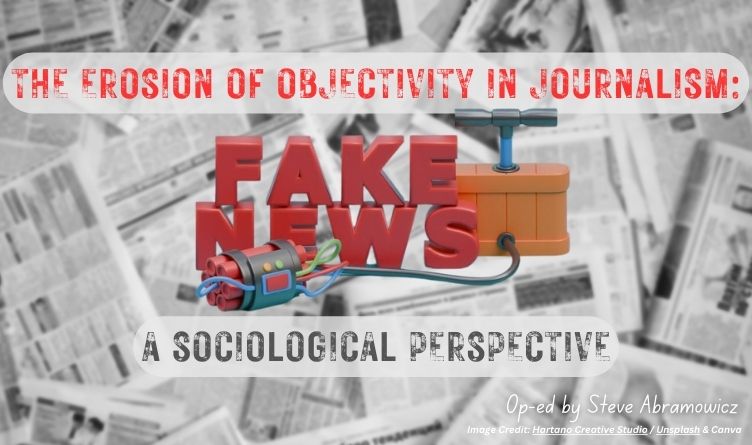Image Credit: Hartano Creative Studio / Unsplash
Submitted by Steve Abramowicz of Heartland Journal –
In an era defined by rapid information dissemination and increasingly polarized political landscapes, the role of journalism is more crucial than ever. However, the objectivity that journalism once upheld is increasingly under threat.
This degradation is not merely a matter of individual bias but reflects broader sociological trends and manipulative practices that shape public perception. The distinction between news columns and editorial pages has blurred, leaving audiences to question the reliability of the information they consume. The 2024 political campaigns serve as a vivid illustration of this phenomenon, where media manipulation and authoritarian rhetoric have become commonplace.
To understand the erosion of objectivity in journalism, it is essential to contextualize it within a sociological framework. Sociology, as a discipline, examines societal structures, relationships, and the dynamics that govern human behavior. The intersection of sociology and journalism reveals how societal norms, values, and power structures influence the narratives presented in the media.
In recent years, we have witnessed the emergence of sociological science and sociological law, which seek to apply scientific principles and legal frameworks to understand societal behavior. Similarly, sociological news has emerged as a category that emphasizes the study of social phenomena through a journalistic lens. However, the challenge arises when the very principles that underpin these sociological inquiries are undermined by the subjective nature of reporting.
The news media, traditionally seen as the fourth estate, is expected to provide unbiased, fact-based reporting that informs the public and holds power to account. However, the increasing intertwining of news and opinion has led to a situation where objectivity is often compromised. For example, the lines separating news columns from editorial pages have become less distinct, with many publications adopting a more opinionated stance in their reporting. This shift not only affects the credibility of individual journalists but also distorts public understanding of critical issues.
The 2024 political campaigns exemplify the erosion of journalistic integrity and the rise of media manipulation. As candidates vie for public attention and support, the media landscape has become a battleground where narratives are crafted, shaped, and sometimes weaponized. Rather than serving as impartial observers, many journalists have found themselves caught in the crossfire of political agendas, forced to navigate a complex landscape where the truth is often obscured.
For instance, during the presidential primaries, numerous media outlets engaged in sensationalist reporting that prioritized clicks and engagement over factual accuracy. Candidates’ statements were often taken out of context, leading to misleading headlines that fueled partisan divides. This practice not only misinforms the public but also undermines trust in journalism as an institution.
Moreover, the rise of social media has exacerbated this issue. Platforms like Twitter and Facebook have transformed how news is consumed, with algorithms prioritizing sensational content that generates clicks and shares. As a result, traditional journalistic standards are often sacrificed in favor of virality. This phenomenon has given rise to “clickbait” journalism, where the focus shifts from delivering accurate news to crafting attention-grabbing headlines.
The manipulation of media narratives is not limited to sensationalism; it also includes the strategic use of misinformation and propaganda to further authoritarian agendas. In recent years, we have witnessed a troubling rise in authoritarianism across the globe, accompanied by a concerted effort to control the media narrative. Leaders have utilized various tactics to undermine journalistic integrity and promote their own narratives, leading to a dangerous interplay between media and power.

In the context of the 2024 elections, several candidates have employed authoritarian rhetoric that seeks to delegitimize independent journalism. By labeling unfavorable coverage as “fake news,” these leaders attempt to create doubt about the credibility of the press, effectively silencing dissenting voices. This strategy not only erodes public trust in journalism but also poses a significant threat to democracy itself.
Forrest Boyd, a White House correspondent, remarked that journalism “objectively has taken a beating in recent years.” His observation underscores the broader challenges faced by journalists as they navigate an increasingly hostile environment. The pressure to conform to political narratives, coupled with the fear of backlash from powerful figures, has led many journalists to self-censor or adopt a more cautious approach in their reporting.
As the boundary between news and opinion continues to blur, the need for a return to journalistic objectivity becomes ever more pressing. Objectivity should not merely be a lofty ideal but a foundational principle that guides journalistic practice. To restore credibility and trust, journalists must recommit to providing accurate, unbiased reporting that serves the public interest.
This requires a concerted effort to prioritize fact-checking, transparency, and accountability in reporting. Media organizations must invest in training journalists to navigate the complexities of modern reporting while maintaining ethical standards. Furthermore, audiences must be encouraged to critically evaluate the information they consume, seeking out diverse perspectives and verifying claims before forming opinions.
In the face of media manipulation and authoritarianism, the role of journalism as a watchdog is more critical than ever. By upholding the principles of objectivity and integrity, journalists can serve as a counterbalance to the forces that seek to distort the truth. As we move forward, it is imperative that the media recommits to its foundational mission: to inform, educate, and empower the public in a world where the line between fact and fiction is increasingly difficult to discern.
The erosion of objectivity in journalism reflects broader sociological trends that shape our understanding of the world. As the lines between news and opinion blur, and as media manipulation becomes more pervasive, the need for a return to journalistic integrity is paramount. The 2024 political campaigns serve as a stark reminder of the challenges faced by journalists in navigating an increasingly complex landscape. By recommitting to the principles of objectivity and accountability, journalism can reclaim its vital role in a democratic society, ensuring that the truth prevails in the face of manipulation and misinformation.





One Response
Proverbs 15:22
Without counsel purposes are disappointed: but in the multitude of counsellors they are established.